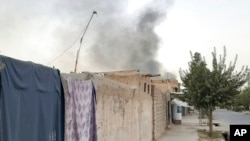U.S. airstrikes are helping to blunt Taliban advances across Afghanistan, although Pentagon officials warn American air power alone will not be enough to push back the insurgent offensive.
For weeks, the United States has been launching "over-the-horizon" strikes from its Al Udeid Air Base in Qatar and from its carrier strike group in the Persian Gulf, hitting Taliban targets with a heavy mix of AC-130 gunships and MQ-9 Reaper drones.
But there have been questions regarding the effectiveness of the strikes, with Taliban officials claiming the group has captured seven provincial capitals over the past five days, and tweeting Tuesday that an eighth capital, Faizabad, in Afghanistan's Badakhshan province, was about to fall.
"We have every confidence that those strikes are hitting what we're aiming at and are having an effect on the Taliban," Pentagon press secretary John Kirby told reporters Tuesday, saying additional strikes have been carried out "in just the last several days."
Kirby acknowledged U.S. airstrikes alone would not be enough to hold Taliban fighters at bay.
"Nobody is suggesting, nobody has suggested here at the Pentagon that airstrikes are a panacea that will solve all the problems, all of the conditions on the ground," he said.
"What we have said is that the Afghan forces have the capability, they have the capacity, they have a numerical advantage," Kirby added. "It's really going to come down to the leadership and the will to use those capabilities."
At the White House on Tuesday, President Joe Biden echoed that call.
"They've got to want to fight," he told reporters, adding there will be no reconsideration of the U.S. decision to complete its military withdrawal by August 31.
"We spent over a trillion dollars over 20 years. We trained and equipped with modern equipment over 300,000 Afghan forces," Biden said. "They outnumber the Taliban."
"They have to fight for themselves, fight for their nation," he said.
U.S. officials argue that fighting back will allow the Afghan government to gain leverage in ongoing negotiations with the Taliban. But despite an announcement earlier this month by Afghan President Ashraf Ghani that the military had launched a new campaign to stabilize the country, there have been few signs of progress on the ground.
In a series of posts on social media Tuesday, Taliban spokesman Zabihullah Mujahid said Taliban fighters had captured Farah, the capital of Afghanistan's Farah province, and said their forces were "on the verge of entering Feyzabad city," the capital of Badakhshan province.
VOA could not independently verify the claims. There was no immediate confirmation by Afghan government officials.
U.S. officials have pledged continued support to the Afghan government and security forces beyond the August 31 deadline for Washington's military withdrawal. That includes a proposed $3.3 billion in funding for Afghan security forces in the proposed Fiscal Year 2022 budget.
U.S. officials also point out that the U.S. has already provided the Afghan air force with three refurbished Black Hawk helicopters since the withdrawal began this past May, and that another 34 are on the way.
The U.S. is also in the process of purchasing more A-29 Super Tucano strike planes for Afghanistan and continuing to provide maintenance support from afar. Washington, too, has promised to continue to resupply the Afghan security forces with food and equipment, and pay their salaries.
U.S. officials, separately Tuesday, voiced hope that their efforts may find a way to impress upon Taliban leaders that their current offensive is not in anyone's interest.
"There is room for diplomatic progress to be made," State Department spokesman Ned Price said, pointing to the presence in Doha of Zalmay Khalilzad, the U.S. special representative for Afghanistan.
"The idea that we don't have leverage or that the Islamic Republic, the government of Afghanistan doesn't have leverage, is not the case," Price told reporters, cautioning, "There are other tools at our disposal that fall short of reintroducing U.S. forces. We have not ruled any of those out."
For the second day in a row, however, the Pentagon indicated that as the August 31 deadline for the U.S. withdrawal draws closer, U.S. airstrikes, at least, will become less likely.
"The drawdown ... in many ways, in many facets, is all but complete," Kirby told Pentagon reporters. "The where and the when in terms of feasibility of these strikes is going to be different and it's going to decline."








